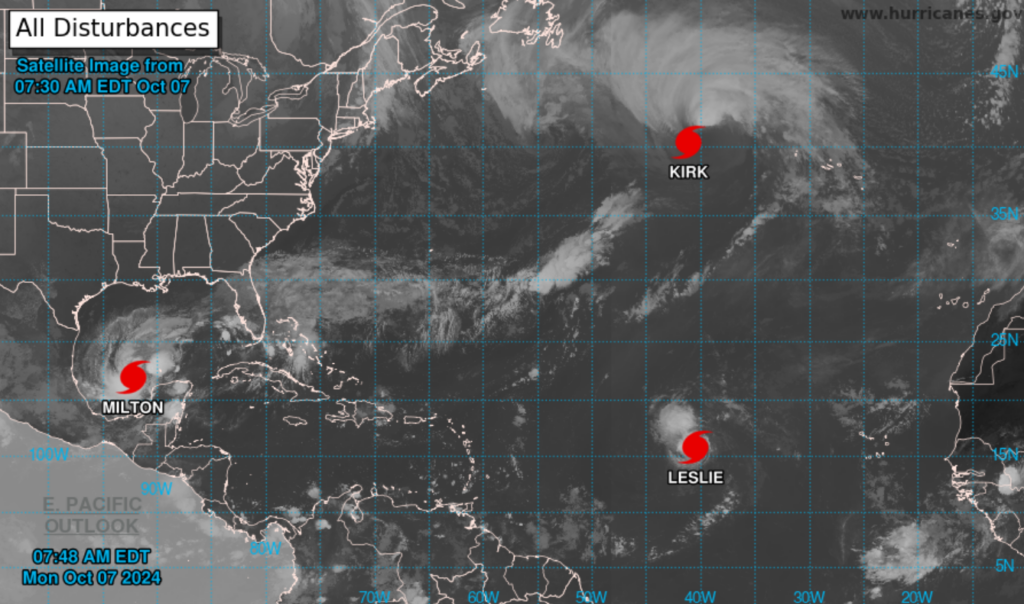Hurricane Milton has rapidly intensified into a Category 3 storm, marking a significant meteorological event as it heads towards Florida’s Gulf Coast. This intensification has raised concerns as it is set to make landfall just eleven days after Hurricane Helene impacted the region. With currently reached maximum sustained winds of 125 mph, Milton is now classified as a ‘major’ hurricane on the Saffir-Simpson Hurricane Wind Scale. The National Hurricane Center (NHC) has issued warnings of life-threatening storm surges and damaging winds for the western coast of Florida, particularly emphasizing the Tampa Bay area, where surges of 8 to 12 feet are projected, significantly exceeding those recorded during Hurricane Helene.
In response to this unfolding crisis, Florida Governor Ron DeSantis declared a State of Emergency for 51 counties, a significant increase from the 35 counties identified the previous day. This declaration is aimed at facilitating a more efficient mobilization of resources to aid affected communities ahead of Milton’s anticipated impacts. The Florida Division of Emergency Management has highlighted that the ongoing evacuation orders are the largest seen since 2017, prompting officials to encourage residents to finalize their preparedness plans and consider evacuating as soon as possible to avoid congested routes. Local officials, including Tampa’s Mayor Jane Castor, are pushing residents to leave now to ensure their safety from the impending storm.
The implications of Hurricane Milton are compounded by recent criticisms directed at the Biden-Harris administration, specifically regarding the Federal Emergency Management Agency (FEMA). Just before Milton’s escalation, North Carolina had suffered severe impacts from Hurricane Helene, leading to substantial criticism of the federal response. Reports surfaced indicating that FEMA was facing funding challenges that could hinder its ability to respond adequately during the remainder of the hurricane season, raising alarms given the backdrop of previous disasters. Furthermore, Homeland Security Secretary Alejandro Mayorkas acknowledged the financial constraints facing FEMA, attributing them in part to the agency’s allocations towards managing migrant relief efforts.
As the government grapples with these emergencies, political tensions are rising. Critics have highlighted a perceived disparity in the response resources allocated to American citizens compared to those given to non-citizens, expressing frustration with the administration’s handling of disaster relief. High-profile incidents, such as Mayorkas’s recent luxury shopping spree amidst a national crisis, have intensified scrutiny over the leadership’s priorities. This situation has led to dissatisfaction among citizens who feel neglected as they navigate storm preparedness against the backdrop of federal resource management.
Amidst the chaos of natural disasters, political dynamics remain starkly polarized. As critiques of President Biden and Vice President Harris intensify, many observers note the contrasting levels of public scrutiny faced by different administrations. Commentators have drawn parallels to the responses following Hurricane Katrina, suggesting that the current administration would be subjected to a far harsher critique had a Republican been in office during this crisis. The discussions highlight a broader concern about the equitable distribution of aid and the efficiency of disaster management practices across different political leaders and contexts.
As the storm approaches, residents are urged to stay informed, aligned with their local emergency management efforts, and heed evacuation recommendations. The situation reflects not just the immediate risks posed by Hurricane Milton but also the broader implications of governmental preparedness and public trust in federal disaster response mechanisms. The public’s perception of the government, especially in desperate times, is crucial, signifying the need for a responsive and responsible management approach to natural disasters that prioritizes citizens’ safety and welfare above political agendas.

